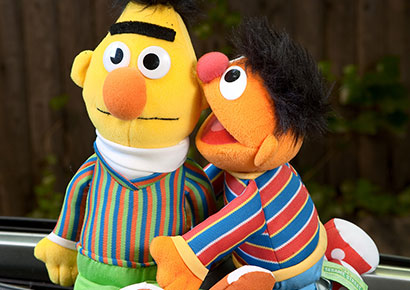Why did Sesame Street have to deny that Bert and Ernie are a gay couple?

Pic: See-ming Lee / Flickr
The producers of Sesame Street have again refuted claims that Bert and Ernie are a gay couple. But why did they feel the need to do so?
In an interview with former Sesame Street writer Mark Saltzman published on the weekend, Queerty’s David Reddish asked him about the long-standing speculation about the puppet duo’s relationship.
In the show, Bert and Ernie – who share a room – aren’t identified as gay but many have argued that they could be more than just good friends. Over the years, their unlikely relationship has become iconic for many in the gay community and in popular culture.
“I always felt that without a huge agenda, when I was writing Bert & Ernie, they were [a gay couple]. I didn’t have any other way to contextualize them,” said Saltzman.
He explained that he based the characters’ relationship on that of the one between himself and his own partner of more than 20 years, the late film editor Arnold Glassman.
“So it was the Bert & Ernie relationship, and I was already with Arnie when I came to Sesame Street. So I don’t think I’d know how else to write them, but as a loving couple,” he explained.
The interview led Sesame Workshop, the organisation behind Sesame Street, to issue a statement on Tuesday. “As we have always said, Bert and Ernie are best friends. While they are identified as male characters and possess many human traits and characteristics, they remain puppets, and do not have a sexual orientation.”
The producers added: “Sesame Street has always stood for inclusion and acceptance. It’s a place where people of all cultures and backgrounds are welcome. Bert and Ernie were created to be best friends, and to teach young children that people can get along with those who are very different from themselves.”
Frank Oz, the legendary puppeteer and creator of Bert then threw in his two cents. “It seems Mr. Mark Saltzman was asked if Bert & Ernie are gay,” tweeted Oz. “It’s fine that he feels they are. They’re not, of course. But why that question? Does it really matter? Why the need to define people as only gay? There’s much more to a human being than just straightness or gayness.”
While Bert and Ernie may well ‘not be gay’ (or have any sexuality at all) as originally conceived, it’s puzzling why the producers and Oz felt the need to step in so forcefully to make these kinds of statements. They could have gracefully ignored Saltzman’s comments and simply allowed viewers and fans to make up their own minds.
In fact, Oz was challenged on Twitter by a follower, Reed Brice: “You may have created him, but you don’t seem to realize or appreciate what he meant to thousands of little boys growing up. You digging in your heels (and wrongly conflating romantic orientation with sexual orientation) with what seems like disgust is abjectly disappointing.”
Another, JarOCats, commented to Oz: “If, as you say, it shouldn’t matter, why do you insist so strongly that they’re straight? Remember, too, that children – including the grown-up ones – infuse beloved fictional characters with traits they identify with. By taking that away from them, you are essentially saying ‘Gay = bad.'”
In 2011, a petition was circulated online calling on Sesame Street to allow Bert and Ernie to marry on the show as an expression of support for marriage equality. In 2013, The characters were featured on the cover of The New Yorker magazine to mark a major US Supreme Court ruling in support of same-sex marriage.
Please see our statement below regarding Bert and Ernie. pic.twitter.com/6r2j0XrKYu
— Sesame Workshop (@SesameWorkshop) September 18, 2018
It seems Mr. Mark Saltzman was asked if Bert & Ernie are gay. It’s fine that he feels they are. They’re not, of course. But why that question? Does it really matter? Why the need to define people as only gay? There’s much more to a human being than just straightness or gayness.
— Frank Oz (@TheFrankOzJam) September 18, 2018
A cover from 2013: Bert and Ernie’s “Moment of Joy.” https://t.co/iVmV1JyDxa pic.twitter.com/licDoenyaV
— The New Yorker (@NewYorker) September 18, 2018
Leave a Reply